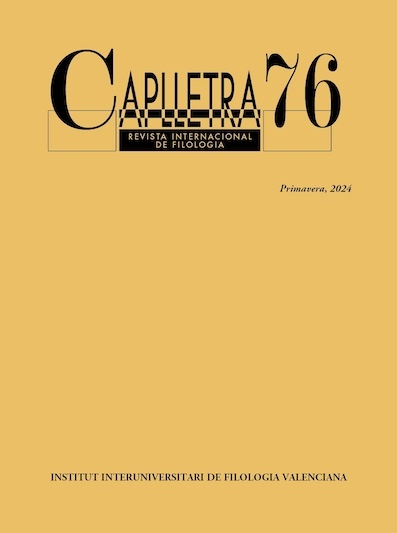Evaluative morphology and semantic change. The process of subjectification of the suffix «?et/?eta» in Old Catalan
DOI:
https://doi.org/10.7203/caplletra.76.28213Keywords:
(inter)subjectification, Old Catalan, diminutive, diachronic linguistics, semantics, evaluative suffix Abstract
Abstract
The suffix -et/eta has three values in contemporary Catalan: (a) a less subjective one, by which it modifies the extension or intensity of the meaning denoted by the lexeme; (b) a subjective one, by which it positively or negatively evaluates the lexeme it modifies; and (c) some pragmatic values, with an intersubjective nature, linked to the expression of politeness or attenuation. This situation in synchrony is the result of a diachronic process of semantic change. To explain this situation, we have semantically analysed the suffix -et/-eta in Old Catalan with corpus data and explained the observed trends of change. According to the results, and following the trend of (inter)subjectification defined by E. C. Traugott, the suffix goes from values linked to dimension and extension during the 13th and 14th centuries, to developing more subjective nuclei especially during the 15th and 16th centuries, linked to subjective or emotional evaluation. And even from the end of the 15th century onwards, inter-subjective uses of the suffix are documented. We have explained the process as a result of the conventionalisation of conversational implicatures, the result of metonymies of cause & efect type.
 Downloads
Downloads
Downloads
Published
How to Cite
-
Abstract297
-
PDF (Català)142
Issue
Section
License
Authors submitting work to Caplletra for publication must be the legitimate holder of the usage rights. Legitimacy for the purposes of publishing the work must also include images, tables, diagrams and any other materials that may complement the text, whether they are the author of such material or not.
Copyright: on publishing their work in the journal, the author grants Caplletra. Revista Internacional de Filologia usage rights (reproduction, distribution and public communication) for both the paper printed version and for the electronic version.
All work published in Caplletra is covered by the Creative Commons license type Attribution-NonCommercial-NoDerivatives 4.0 (CC BY-NC-ND 4.0).
RESPONSABILITY
Caplletra. Revista Internacional de Filologia does not necessarily identify with the points of view expressed in the papers it publishes.
Caplletra. Revista Internacional de Filologia accepts no responsibility whatsoever for any eventual infringement of intellectual property rights on the part of authors.






